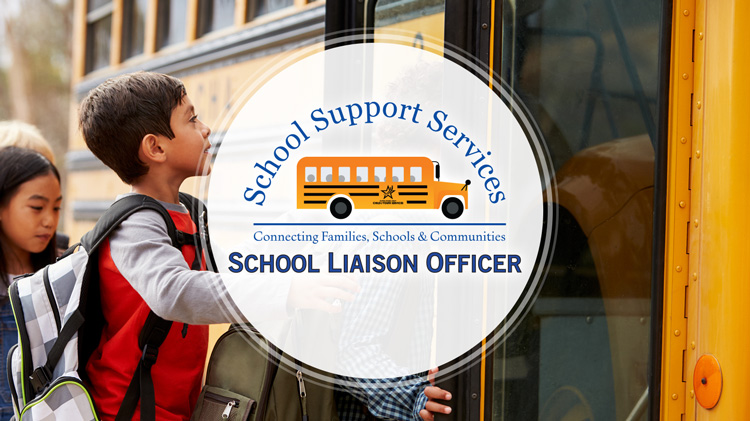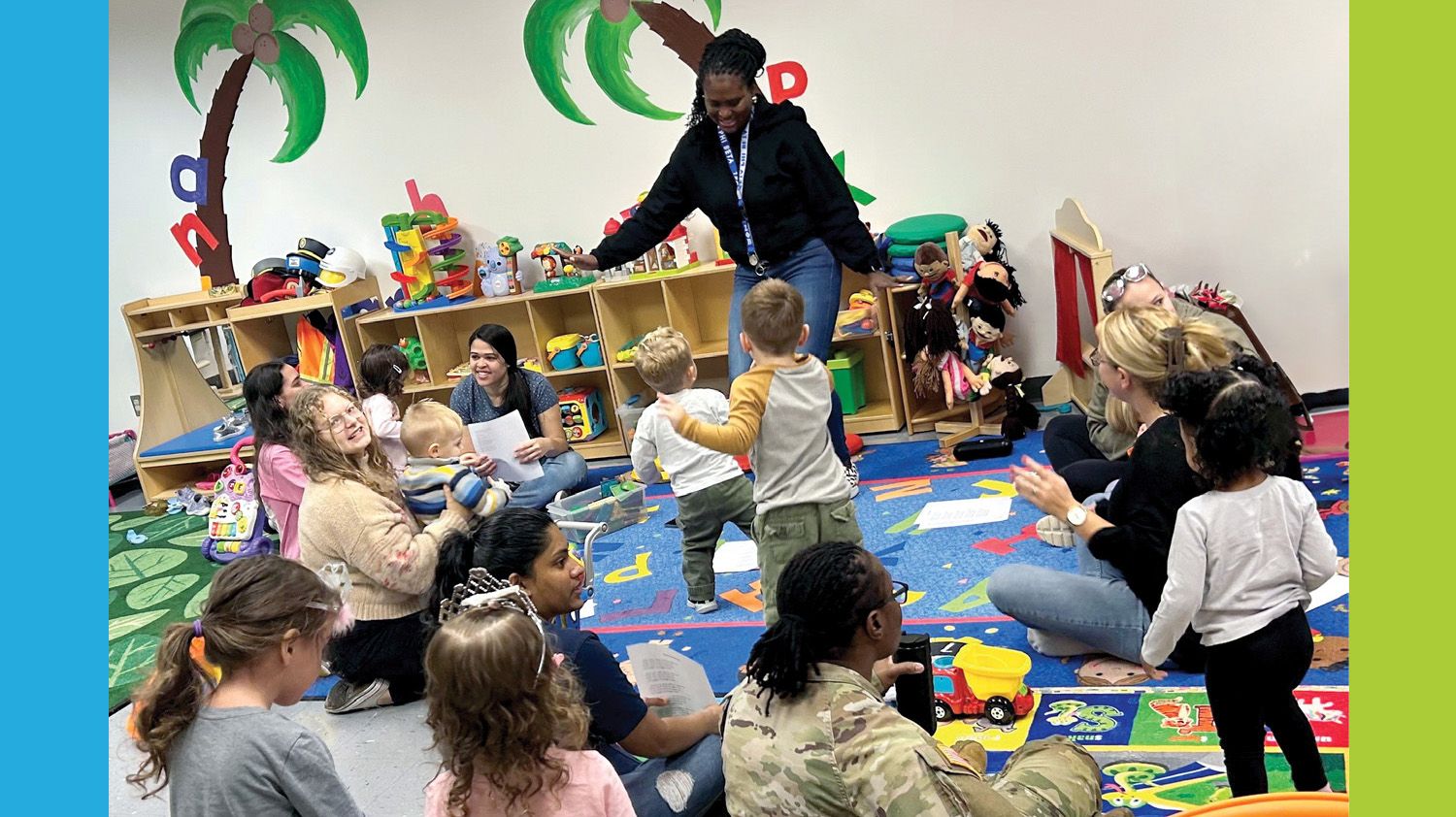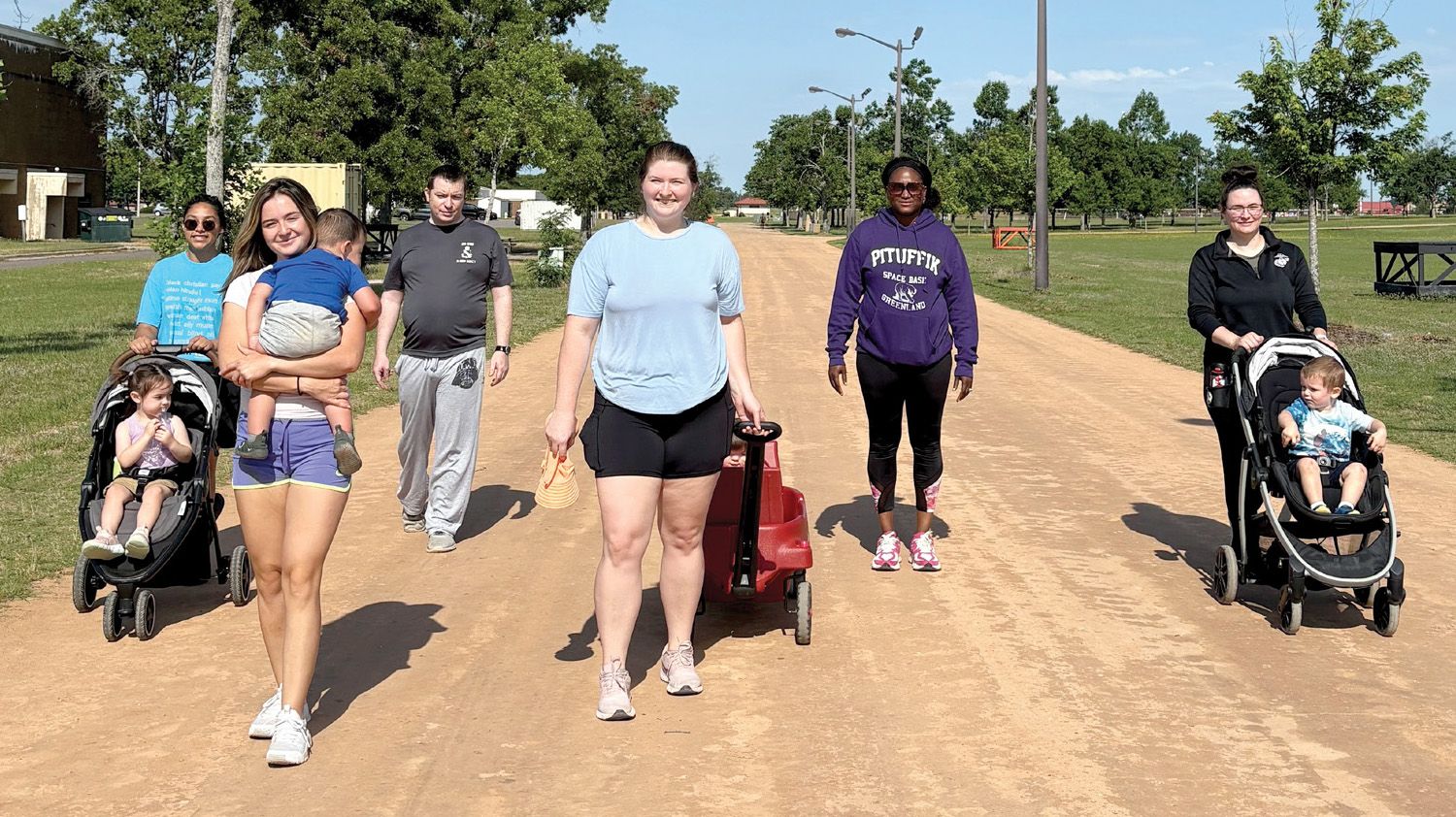- When Do I Need a SLO?
-
Getting ready to move:
- Information about your upcoming duty station and educational options in your new community
- Connection to a youth sponsor who can answer your child’s questions from a youth’s perspective
- Assistance with the steps to prepare for your children’s departure from their current schools
Once you arrive:
- Assistance with school registration and transition
- Help with questions about compliance and solutions regarding the Interstate Compact on Educational Opportunity for Military Children
- Two way communication between the school and parent
- Connection with homeschool co-ops or support groups
During your assignment:
- Answers to your questions about schools, homeschooling, special education, scholarships, transitions and more.
- Parent education opportunities about college and career readiness, preparing for transition and the Interstate Compact
To ease the transition, contact your SLO as soon as you get orders.
- Finding a School
-
Finding a new school and registering your child can be confusing.
We can help.
Our SLOs give you information on local schools so you can find the best fit for you and your family. They can also help you with everything you need to register – and can answer other questions, too. Contact our office and to get more detailed information.
Research-based Characteristics of Quality Schools
Most schools share fundamental characteristics that prepare students for the future. Research shows that the most effective schools are more alike than they are different. Here is some information about what to look for in quality schools:
- Five Key Features of Effective Schools
- The United States Department of Education provides detailed information about choosing a school and offers a great number of resources to help you make an informed decision when choosing a school for your child.
- Local Public School Information
-
Fort Gordon is local to 3 school systems. Where the family lives determines which school a student attends:
Aiken County
Columbia County
Richmond County
- Local Public School Registration
-
Where Do We Register Our Student for School?
Columbia and Richmond County Schools now have online registration. Complete registration instructions are located on the school systems websites:Aiken County (SC): www.acpsd.net
Columbia County: www.ccboe.net
Richmond County: www.rcboe.orgGeorgia Transfers:
- Withdrawal paper from other Georgia school
- Documentation of current address
- Latest copy of student's report card
- Social Security Card
- Completed Vision, Hearing, Dental and Nutritional Form 3300**
- Completed Immunization Georgia Form 3231**
Transferring from another Richmond County School:
- Report card from previous school
- Documentation of current address
Out-of-state transfers:
- Withdrawal paper from other school
- Documentation of current address
- Latest copy of student's report card
- Social Security Card
- Certified copy of birth certificate
- Immunization information transferred to Georgia Form 3231**
- Vision, Hearing, Dental and Nutritional Form 3300**
Enrolling in School
Georgia law requires that children must be 5 years old on or before September 1 to enroll in kindergarten and 6 years old on or before September 1 to enroll in first grade in the public schools. A child who has lived in another state for at least 2 years before moving to Georgia and who was legally enrolled in a public kindergarten or first grade in that state may enroll in a Georgia public school kindergarten or first grade, provided the child will be age 5 for kindergarten and age 6 for first grade by December 31. Pre-kindergarten programs are available for preschoolers at 30 elementary schools and 3 community centers. To qualify for Pre-K, children must be 4 years old by September 1.
If you live on Fort Gordon, Proof of Housing is also necessary when registering.
South Carolina:
New Students
All students entering school for the first time in Aiken County are requested to provide the following documents:- Birth Certificate
- Social Security Number
- Immunization Card/Form
- Proof of Residency
Immunization:
For complete immunization requirements, call 1-800-27-SHOTS or visit S.C. Department of Health & Environmental Control.Age Requirements:
- Child Development (4K): 4 years old by September 1
- Kindergarten (5K): 5 years old by September 1
- First Grade: 6 years old by September 1
Obtaining Immunization, Vision, Hearing, Dental and Nutritional Certificates:
School Screenings: Dwight D. Eisenhower Army Medical Center provides school screenings for military dependents. This does not include sports physicals. To make an appointment for a school screening, please call +1 (706)787-7155 or +1 (706)787-9210. For more information on DDEAMC, please visit eisenhower.amedd.army.mil.
Moving?
Before you move, check out our Quick Checklist for School Moves:
Quick Checklist for School Moves - School/Bus Locator
-
Your Residence and School Zones
Did you know that where you decide to live will determine which schools your children will attend? In order to make an informed decision regarding your future housing, you might want to consider inquiring about the school district that will service your children.
Richmond County:
If you are considering property in Richmond County, use the Richmond County School System School Zone Locator. For more information, contact the Transportation and Zone Department at +1 (706)796-4777.
Columbia County:
If you are considering property in Columbia County, the Columbia County Board of Education website offers a School Locator & Bus Information to find the school for the 2015-2016 school year. Due to rezoning, the school may change for subsequent years. Be aware that realtors and leasing agents do not always have the most up-to-date information. Please call the Columbia County board of Education at +1 (706)541-2723 ext. 5203 to be absolutely sure which school your children will attend.
On Post Residents:
If you are considering living on post, then your children will attend the following Richmond County Schools:
The Academy of Richmond County
Aiken County:
If you are considering property in Aiken County, the Aiken County Public School District website will provide information based on Areas. For more information, call +1 (803)641-2640.
School Zones and Bus Stop Information:
Richmond County: School Locator & Bus Information
Columbia County: School Locator & Bus Information
Aiken County School Locator | Bus Information - Local Private School Information
-
Richmond County Private Schools
Alleluia Community School:
2819 Peach Orchard Road, +1 (706)793-9663
Grades K-12
School day is 8:30 a.m. to 3 p.m.Aquinas High School:
1920 Highland Avenue, +1 (706)736-5516
Grades 9-12
School day is 8 a.m. to 2:40 p.m.The Augusta School:
2623 Washington Road, +1 (706)736-1238
Grades K-8
School day is 8 a.m. to 2:50 p.m.Curtis Baptist School:
Elementary School: 1326 Broad Street, +1 (706)722-2437
Grades K-6
School day is 8 a.m. to 3 p.m.
High School: 2230 Broad Street, +1 (706)736-0196
Grades 7-12
School day is 7:50 a.m. to 2:55 p.m.Episcopal Day School:
2248 Walton Way, +1 (706)733-1192
3 years old through grade 8
School day is 8 a.m. to 3 p.m. for grades 1-8,
8 a.m. to 12:30 p.m. for preschoolHeritage Academy:
333 Greene Street +1 (706)821-0034
Grades K-8 School Day 7:45-3:45 p.m.Hillcrest Baptist School:
3045 Deans Bridge Road, +1 (706)798-5600
Grades K-8 School day is 8:15 a.m. to 3 p.m.Immaculate Conception Academy:
1016 Laney Walker Blvd., +1 (706)722-9964
Grades K-8 School day is 8:15 to 3 p.m.St. Mary on the Hill Catholic School:
1220 Monte Sano Ave., +1 (706)733-6193
Grades K-8 School day is 8 a.m. to 3 p.m.Augusta First Seventh-day Adventist School:
4299 Wheeler Road, +1 (706)651-0491
Grades K-9 School day is 8 a.m. to 3 p.m.Southgate Christian Schools:
2226 Peach Orchard Road, +1 (706)798-2475
Grades K-12
School day is 8:15 a.m. to 3:15 p.m.Westminster Schools:
3067 Wheeler Road, +1 (706)731-5260
Grades K-12
School day is 8 a.m. to 3:20 p.m.Columbia County Private Schools
Augusta Christian Schools:
313 Baston Road, Augusta +1 (706)863-2905
Grades Pre K-12
School day is 8 a.m. to 3 p.m.Augusta Preparatory Day School:
285 Flowing Wells Rd, Augusta +1 (706)434-2381
Grades NS-12
School day is 8 a.m. to 3 p.m.Evans Christian Academy:
213 South Old Belair Rd, Grovetown +1 (706)434-2381
Grades 6-12
School day is 8 a.m. to 3 p.m.Community Christian Academy:
4594 Columbia Rd, Martinez +1 (706)426-8881
Grades K3-12
School day is 8:15 a.m. to 3:15 p.m. - Youth Sponsorship
-
Does your child have 101 questions about your next duty station? Let a youth sponsor answer them!
Youth sponsors connect with children before arrival at a new duty station, provide them with information about their new communities and answer questions from a youth perspective – while being guided by adults in the CYS youth program and the schools.
Once you arrive, a youth sponsor will meet your child and can arrange community and school tours.If you're preparing for a PCS move, contact your SLO today to sign up for a youth sponsor.
- Tutoring/Scholarships
-
Tutoring:
Tutor.com for U.S. Military Families allows eligible students to connect anonymously to an expert tutor online at any time for personalized help with homework, studying, test prep, proofreading and more. One-to-one academic tutoring and on-demand homework help is available at no cost to grades K-12 students and service members in active duty Army, Navy, Air Force and Marine Corps families through funding from the U.S. Department of Defense. Active duty and Reserve Coast Guard service members and their families are also eligible to use Tutor.com/military at no cost through funding from Coast Guard Mutual Assistance (CGMA). Eligible students can create an account and log in at www.tutor.com/military.
Scholarship Quick Reference for Military Students:
www.militaryhandbooks.com: Free handbooks and guides are available for download at this link. The School Liaison Office keeps a copy of the Military Childrens' Scholarship Handbook, which is also available at www.militaryhandbooks.com. The handbook has information on applying to scholarships as a military student and also lists several links for obtaining scholarships.
Georgia Student Finance Commission: www.gafutures.org
Founded in 1965, the Georgia Student Finance Commission has become one of the most successful state student aid operations in the nation. First created to provide loans, the agency progressed to state- and lottery-funded scholarships, grants, service cancelable loan programs and providing free financial aid consultation. GSFC's mission is to ensure Georgians have an opportunity to access education beyond high school.
Hope Scholarship: http://sfs.gsu.edu/scholarships-grants/hope-scholarship
The HOPE Scholarship is funded by the Georgia Lottery for Education and is available only to degree-seeking undergraduate students who meet the definition of a Georgia Resident for HOPE Scholarship Purposes.
Scholarships for Military Children: www.militaryscholar.org/sfmc/index.html
Scholarships are funded through contributions and are awarded annually for each commissary operated by the Defense Commissary Agency worldwide.
Veterans of Foreign Wars of the United States Scholarship: www.vfw.org
Every year, hundreds of thousands of students participate in the Voice of Democracy Scholarship Competition and the Patriot's Pen Essay Contest, garnering more than $3.4 million in scholarships and incentives.
Army ROTC Scholarship at North Georgia College & State University: www.northgeorgia.edu
Army ROTC awards approximately 70 scholarships to new cadets. Army ROTC scholarships pay tuition and fees or room and board, and a monthly stipend ($300 for freshmen, $350 for sophomores, $450 for juniors, and $500 for seniors) and $1,200 per year for books. Scholarships are awarded on merit: academic achievement, extracurricular activities, personal interviews, and physical fitness. If you are selected to receive a scholarship, you will have a commitment to serve 4 years in the Regular Army as an officer after graduating from North Georgia.*For Georgia residents who are eligible for the HOPE Scholarship, the Army ROTC Scholarship will be used to pay for room and meals.
Children's Scholarship Handbook: www.federalhandbooks.com
American Patriot Freedom Scholarship: www.homefrontamerica.org
Established in 2006 to offer appreciation to those families who have dedicated themselves to protecting the American Virtues that all Americans enjoy. Each year, military dependent children from around the world submit their essays to the American Patriot Freedom Scholarship Program, hoping to receive one of twenty-five $1,000 scholarships.
Ron Brown Scholarships: www.RonBrown.org
The award: Leadership, Community Service, and all fields. The deadline is usually in January. This is one of most prestigious scholarships and it is highly competitive.
Jackie Robinson Foundation Scholarship: www.JackieRobinson.org
The award: $6,000 per year, with approximately 100 winners. Academic merit, leadership, community service and all fields. The deadline is usually in April.
United Negro College Fund Scholarships: www.uncf.org
The UNCF is one of the organization's major scholarship gateways. The awards are of varying amounts, and there are a great many under different names and requirements ( Grandmet, Duracell, for example).
NACME Scholarships (National Action Council For Minorities in Engineering): www.nacme.org
The award amounts to $20,000, and many are awarded. This is NACME's major engineering scholarship gateway. You must be an engineering student. The deadline is usually in February. Visit the the web site for details, or contact aid officials at your college.
Gates Millennium Scholarships: www.gmsp.org
The Gates Millennium Scholarship is to promote academic excellence and to provide an opportunity for thousands of outstanding students with significant financial need. The scholarship will cover room, board and tuition for at least 1,000 high school students a year.
NSBE Scholarships—(National Society of Black Engineers). Go to: www.nsbe.org
Award amount: Generally range from $1,500 to $3,000 for members of NSBE. Number of awards varies. This is primarily for engineering students, and others majoring in related disciplines. Deadlines vary.
American Institute Of Certified Public Accountants Scholarships (AICPA). Go to: www.aicpa.org
For undergraduates studying accounting at a U.S. college with at least 30 credits completed. Awards up to $5,000 with about 300 winners annually. Deadline is in July. Visit the web site for GPA requirements and details.
Coca-Cola Scholars Scholarships: www.coca-colascholars.org
This is a major competition with over 250 awards going to scholars with academic, leadership and talent qualities. The award amount ranges from $4,000 to $20,000.
Ambassadorial Scholarships: www.rotary.org
This is the prestigious "Rotary" organization scholarship for students who can speak another language and want to study abroad in the host country of that language. Award amounts are from $10,000 to $23,000 for a 3-month to full year of study abroad. You should have completed at least 2 years of college work.
Ronald McDonald House Charities and the United Negro College Fund: rmhc.org
Students must be studying at an HBCU (Historically Black Colleges and Universities), which is a member of the UNCF. The award is from $1,000 to full tuition. Approximately 60 students are selected.
Xerox Technology Minority Scholarship: www.xerox.com and type in "Scholarship" in the search engine.
This is a good scholarship for students studying in areas like chemistry, engineering, physics, and "tech" areas. The award amount is up to $4,000 for undergraduates and more for graduate students.
Alpha Kappa Alpha Scholarships: www.akaeaf.org
The above link is to the Chicago headquarters and the gateway to scholarships opportunities. Note that there are over 700 AKA Chapters – applicants are advised to contact the sorority in their local vicinity.*Note: all of our Greeks (listed in our Black Excel college guide) offer scholarships, and you should contact your local chapters.
NCAA Scholarships (National Collegiate Athletic Association): www.ncaa.org
This is the major NCAA sports association with which student-athletes are associated. Awards are given in all sports categories in amounts ranging from $3,000 to $12,500. Awards are also available for sports-related study (such as sports journalism). Deadlines vary, as do the number of awards each year.
Harry S. Truman Scholarship: www.truman.gov
The is one of the most prestigious scholarships, shaped for students who intend to pursue a career targeted to public service or government. Graduate study should be a goal, with a portion of the funds directed there. You must be at least a junior, and your college must nominate you. A “nomination package” must be created. The awards can reach as high as $30,000 over the years. Generally about 80 students are selected. Visit the web site for deadline details.
National Association of Black Journalists: www.nabj.org
Offers 10 scholarships for a $2,500 award. Students should be attending a 4-year university. They must present three letters of recommendation from a school adviser, dean or a faculty member. Also, a 500-800 word article on a Black journalist must be presented. A grade point average of 3.0 is desirable. Eligible students must be majoring in journalism-print, photography, radio or television. One of those should be a career goal.
Hispanic Scholarship Fund: www.hsf.net
This is a major site for Hispanic students majoring in business-related areas, A to Z (accounting, human resources, communications and more). The award amount varies and over 140 awards are granted.
Arts Recognition And Talent Search Awards: www.youngarts.org
These awards are granted to high school or college students (17 to 18 years of age) who show talent in dance, voice, music, art, photography, jazz, visual arts, writing, or other creative areas. You must audition or submit a portfolio or tape. The award is to be used for the freshman year in college. Award amounts vary from $100 to $3,000.
Society of Women Engineer Scholarships: societyofwomenengineers.swe.org
These scholarships are targeted for women who are majoring in engineering or computer science. The award amount is from $200 to $5,000, and at least 90 are granted.
American Institute of Architects Minority Disadvantaged Scholarship: www.archfoundation.org
This is a scholarship is for minority students enrolling in architecture programs. Awards are from $500 to $3,000 and generally 20 students are selected.
Non Commissioned Officers Association: www.ncoausa.org
For children and spouses of members of the Non Commissioned Officers Association. Awards are not limited by race, color, creed, national origin or sex. For undergraduate study at accredited colleges and universities. Children of members must be under age 25 to receive the initial grant.
Military Officers Association of America: www.moaa.org
Applicants for all of our programs must be planning to attend accredited colleges or universities as full-time students. All loans, grants, and scholarships are designated for students seeking their first undergraduate degrees. No loans, grants, or scholarships are applicable for graduate study.
OTHER LINKS
www.fafsa.ed.gov — The Smart Student Guide to Financial Aid
www.accessgroup.org — Information on financial services for college students
www.college-scholarships.com — 2001 Colleges, College Scholarships and Financial Aid Pages
www.uscg.mil/mwr/hqrec/CGESScholarshipProgram.asp — This page is a listing of scholarships on the institute's website
www.wilsonfund.org — Wilson Scholarship Fund
www.apa.org/mfp — The American Psychological Association
Military In-State Tuition and Waivers
Qualifying for In-state Tuition or Waiver at a College or University
Out-of state tuition can increase the cost of a college education considerably. Thanks to the updated GI Bill, most states now allow dependents of active duty service members to qualify for in-state tuition (or a waiver of out-of-state tuition) even though the state of current residence is not the service member's home of record. This opportunity may also be extended if the service member is reassigned overseas and the family remains in the States.
Meeting college or university residency criteria to establish qualification for in-state tuition can be tricky. It is imperative that both parents and students clearly understand residency policies including the acceptable time-frame for eligibility, the impact of change of major or degree plan, or if a transfer to another state post-secondary institution is permissible.
The following are some sites that provide information on in-state tuition and either state and/or service related contacts. If you have state-specific questions, contact the listed state resources.
The Department of Veteran's Affairs:
The military has worked hard in recent years to encourage states to offer in-state tuition and/or waivers to the children of the military under specific circumstances. Information can be found at the National Military Family Association website.
Military OneSource has a very informative article devoted to Tuition Help for Military Children.
- Special Education Information
-
If you have a child with special needs, we can help you find the resources available in your school district. We can also connect you with your local installation’s Exceptional Family Member Program (EFMP) office.

- Additional References & Resources for Special Education
-
Highly mobile children are entitled to an expedited process, including: a) evaluations in 30 days instead of 60 days, b) removed delays due to school district schedules for Families moving during incomplete screenings, c) continued Extended School Year for students moving in the summer. The United State Department of Education, Office of Special Education and Rehabilitative Services outlines these requirements for State Directors of Special Education.
The Center for Parent Information and Resources offers parent education, acronyms, tools, webinars and a directory of local Parent and Information Training Centers to appropriately advocate for their children, proactively supporting personal accountability. Funded by OSEP.
Military OneSource has a range of resources in caring for a family member with special needs: education, health care, legal, financial, points of contact (EFMP, School Liaisons, etc.)
Military Community & Family Policy-Office of Special Needs provides directory of age-specific resources and States at a Glance for state education special education resources and parent resources.
DirectSTEP provides no-cost, Army sponsored online training for educators and parents on a host of special education topics such as understanding federal requirements, best practices for behavior management, IDEA eligibility, IEPs and more. Through the eCourses parents and educators learn how to apply education laws in order to obtain positive outcomes associated with critical education issues. Access the course listing and registration page through the links below.
- Resources
-
Local School System Websites:
Aiken County (SC): www.acpsd.net
Columbia County: www.ccboe.net
Richmond County: www.rcboe.orgOther Resources:
Military Child Education Coalition (MCEC)
Military Impacted Schools Association (MISA)
Home School Legal Defense Association
DoDEA Crisis Management Toolkit
- Home School
-
Home schooling has become mainstream and widely-used. We offer resources and information to help you provide quality home-based education.
Home School Legal Defense Association provides information on home school law, and general support and information about homeschooling.
- Local Home School Information
-
The Georgia Department of Education does not supply the curriculum, materials or resources for home school. The law requires the following five content areas:
- Mathematics
- English Language Arts
- Science
- Social Studies
- Reading
The home study program shall provide a basic academic educational program which includes, but is not limited to, reading, language arts, mathematics, social studies, and science, however, you may teach other content areas. For curriculum, testing and resource materials, please contact a home school association in your area or use your browser to search for the term Georgia Home School Curriculum or Home School Curriculum. Select a vendor/program that fits your child's educational needs. If there is any cost for the curriculum, the parent will be responsible. It is advisable to secure your curriculum prior to registering your child/children by submitting the Declaration of Intent online. You must submit a declaration of intent by September 1st or within 30 days after a program is established. You may employ a tutor. Parents must have a high school diploma or GED.
If your child/children are enrolled in Georgia Cyber Academy, Georgia Connections Academy, or Provost Academy – your child/children are NOT considered home school students. These are state board-approved online charter schools. You must communicate with these schools for any documents you may need.
The Georgia Department of Education has a very limited role related to home school. The Georgia Department of Education is only responsible for maintaining the Declaration of Intent records.
CLICK HERE to Submit an Online Declaration of Intent Form
- Fields with an asterisk (*) are required fields.
- The "Signature" and "Date Submitted" fields are not required on the online form.
- For the field "The school year for this home school study program", the law requires 180 instructional days. Put the actual date you begin teaching your child/children at home as the beginning date and counting forward to the 180 instructional days limit. However if your child/children began the school year in a public/private school that time can be included as part of this 180 instructional days requirement. You can teach more days if you desire.
- Once you're finished, press the "Submit Your Declaration of Intent" button located at the bottom of form. After you click the submit button, you will receive a screen that shows a 36-unique-character parent signature line as well as the date of submittal.
- Print a copy of this form for your records. This is the only document you are required to submit to the Department of Education. This form represents confirmation that your child/children are officially registered in home school. The Department of Driver Services and the Department of Labor will need this form if your child wants a driving license/permit or a work permit.
Once the child/children are officially registered as a home school student, you as the parent have similar rights and responsibilities of the Local Education Authority (District office). The parent is considered the superintendent, principal, teacher, and you can create and sign any document that relates to the educational needs of your child/children.
If you wish to return your child to public school, you may do so at any time. You can create a withdrawal form and give it to the local school. The local school must validate each content area your child/children took while being home schooled. This validation process is unique to each district. If you have questions related to this process, please contact your local school district. You must test your child/children at the end of third grade and every three years afterwards (example: grades 3, 6, 9, 12). The test must be a nationally standardized test (CRCT and EOCT are not nationally standardized test). Please contact a home school association in your area to obtain information on these tests, time, and the location.
Effective July 1, 2013, Georgia law indicates you are no longer required to submit an attendance form to the Georgia Department of Education (GaDOE). Declarations of Intent (DOI) must still be submitted to the GaDOE each year. These forms should be submitted electronically using the GaDOE website. Electronic submissions automatically provide the parent with a 36-unique-character parental signature. Georgia law dictates that the DOI must be submitted by the parent or guardian only – the GaDOE will not accept third party submissions.
If possible, submission of the DOI should be done electronically, however, mailing, emailing or faxing is acceptable. Please note that, when mailing, emailing or faxing, it may take several weeks to input your DOI into our files.
The GaDOE no longer issues Certificate of Attendance. Your DOI with the 36-unique-characters on the parental signature line is the official document of the Georgia Home Study Program. This document should be used to obtain driver's license/permits, work permits, post-secondary admission, military enlistment, and for all other entities that require proof of educational enrollment. For Social Security verification, please Click Here to access and print the letter.
For more information on Home Schooling in Georgia, please visit the following websites:
- Georgia Department of Education
- Georgia Home School FAQ’s
- Georgia Home Education Association
- Acceptance by Public Schools of Transfer Credits
Home Schooling with installations who have DoDEA schools, please review the following:
Home School Advocacy
Local Support Groups
Fort Gordon Home School Group
Email: ftgordonhomeschoolgroup@gmail.comAugusta-Area Home Education Network (AHEN)
Serving Augusta, GA
Phone: +1 (706)868-5666
Email: reedacademy@comcast.netCentral Savannah River Area (CSRA) Home Education Association
P.O. Box 204568, Augusta, GA 30917
Phone: +1 (706)737-9656
Email: csrahea@gmail.com
www.csrahea.org
*Membership Fees - Transition Support
-
We understand that military transitions for children include much more than school plans and enrollment. We have a number of resources to help make your move as easy as possible for the kids, including:
Military Kids Connect provides online age-appropriate resources to help parents, teachers and children cope with the unique challenges of military life.
The Interstate Compact on Educational Opportunity for Military Children (MIC3) addresses key transition issues military Families experience, including enrollment, placement, attendance, eligibility and graduation. All 50 states have signed the compact and are in varying stages of implementation and/or compliance. The compact applies to children of Active Duty service members, National Guard and Reserve members on active duty orders and members or veterans who are medically discharged or retired within past year.
If you feel that you have an issue that the Compact can help address talk with your SLO. The SLO is able to assist by connecting with both the sending and receiving school to assist in resolving the issue. If it is not possible to resolve the issue locally, the SLO will help you work with the state commission, and if needed, the national office.
- Post - Secondary Support
-
Our support doesn’t end with elementary education. If you have children preparing for academic life after high school, we can help you find information about testing opportunities, scholarships and military-specific resources that can help you plan.
The US Department of Veteran’s Affairs provides information about Military-Specific and Government Academic Support G.I. Bill
The Transferability of Educational Benefits for the Post 9/11 GI Bill are very specific. The Defense Manpower Data Center, through MilConnect will guide you through the transfer process and your eligibility to do so. Speak with an Education Counselor prior to making this election in order to ensure you understand the benefit.
In-State Tuition Programs for Military: Service-members, active duty for a period of more than 30 days and their dependents are eligible to receive in-state tuition at many public colleges and universities in the state where they reside or are permanently stationed. An enrolled dependent may pay in-state tuition as long as he or she remains continuously enrolled at the institution, even if the service-member is reassigned outside of the state. Regulations outlined in the Higher Education Opportunity Act, 2008 (P.L 110 - 135) and the Higher Education Act of 1965 (pdf) apply.
- Resources
-
Here are some additional web resources to assist you with your child’s education:
Academic Resources:
Tutor.com for U.S. Military Families makes live tutors available online 24/7 to help with more than 40 core subjects and standardized test preparation.
Homework Support: Army Child Youth & School Services provides Homework Labs in before/after school programs for elementary students at the School Age Center, and for middle and high school students at the Youth Center.
A personalized learning resource for all ages Khan Academy offers practice exercises, instructional videos, and a personalized learning dashboard that empower learners to study at their own pace in and outside of the classroom. We tackle math, science, computer programming, history, art history, economics, SAT and more.
Support/Resilience Resources:
School Support Services include information about other programs you can use for support and resilience-related issues.
Military Family Life Counselors (MFLCs) are available to meet in-person on or off the military installation. The free nonmedical sessions are anonymous and may occur in individual, couple, family or group settings. Child Behavioral Specialists are located on the installation in Child, Youth and School Services programs, and in highly impacted schools located on and off the installation.
Military OneSource has access to free nonmedical counseling that’s anonymous and available online, on the phone or in person. Twelve free sessions may occur in individual, couple, family or group settings.
Ready and Resilient Workshops for youth and educators are offered through the SLO and Youth Center programs. These workshops provide educators and students with the same tools Soldiers receive through their Ready and Resilient training. As Master Resilience Trainers SLOs strive to develop a common language around resilience for educators, youth and their parents.
For information on how to attend a class contact your local SLO.
College and Career Readiness Resources:
College and career readiness includes the content knowledge, skills and habits that students must have to be successful in postsecondary education. It also includes training that leads to a sustaining career. A student who is ready for college and career can qualify for and succeed in entry-level, credit-bearing college courses without needing remedial or developmental coursework. These links have tools that will help you plan for your child’s college and career readiness:
Army Educational Outreach Program (AEOP) provides STEM opportunities for military connected youth. The website provides information about AEOP programs available to youth, scholarship opportunities, news, and ways to get involved.
Military.com Scholarship Finder Military.com provides a search engine to help you find money for your child’s higher education needs. Search over 1000 scholarships intended for military youth. They also have a Military Scholarship Handbook.
School Support Services Scholarship Database Listing of crowd sourced scholarships for military connected youth. Scholarships are listed in alphabetical order and provide information on deadlines and qualifications.
Financial Aid
Provides a description of federal student aid programs from the U.S. Dept. of Education and how to apply for them.
Free Application for Federal Student Aid (FAFSA). Apply for federally funded financial assistance for education beyond high school.
Get Ready for College - College Planning, Financial Aid
- Frequently Asked Questions
-
What is a Unique Military Child Identifier? Numerous states have enacted a voluntary report-only self-identification of military children within their public school systems. This data collection would allow monitoring of critical elements such as academic progress and proficiency, special and advanced program participation, mobility and dropout rates. Requirements and method of collection vary from state to state.
Impact Aid
Many local school districts across the United States include within their boundaries parcels of land that are owned by the Federal Government. They must provide a quality education to the children living on the Indian and other Federal lands while sometimes operating with less local revenue than is available to other school districts, because the Federal property is exempt from local property taxes.
Congress has provided financial assistance to these local school districts through the Impact Aid Program. Each year Military members and Federal employees complete a Survey Form. The amount of Impact Aid – or federal assistance –received is determined by the number of eligible parents/guardians who complete the survey form. It partially compensates school districts affected by federal activity for local tax losses resulting from tax-free federal installations.
Impact Aid Fact Sheet (we will provide a hand out to link to)
Impact Aid Website
At overseas/international locations where there is not a Department of Defense Education Activity (DoDEA) school, NDSP supports a variety of options for your children, ranging from public or private schools to homeschool programs. NDSP has a team of education specialists who are available to provide transition and educational support and coordination for all students, including those with special needs. Sponsors are encouraged contact the NDSP as soon as possible for specific school information.
Phone Number +1 (571)372-5863 or +1 (571)372-1897
For families that are new to Fort Gordon, I understand that you provide help with registration, transitioning from school-to-school with academic curriculum and schedules, and varying graduation and records transfer requirements. Should families visit your office only if they are experiencing difficulties with registration or should they stop by before they attempt registration?
It is great to hear from families before, during, and after their PCS to the area. We actually see all in-processing Soldiers when they arrive and, we know that the information we give them doesn’t always make it home to their spouses. But, if a spouse wants to come in to see us—that's great too! We also assist with difficulties. Parents should be aware, we can’t make recommendations of "which school is better or the best". That question is specific to each family. What is good for one family/student might not be the same as what is good for another family/student.
What services do you provide to families who are currently living here (not recently moved)?
We try to make sure that we have current information about what is happening in all the local schools/school districts. We post information on the CYS Facebook page about these events. We also post information on this website.
How can your office help a child who has a deployed parent?
We have provided information about deployment to all the school counselors, administrators, and District staff. We also have 10 school Military Family Life Counselors (MFLC) in 14 local schools: Freedom Park, Sue Reynolds ES, Langford MS, Academy of Richmond County, Cedar Ridge, Baker Place, Grovetown ES, Grovetown MS, Grovetown HS, Columbia MS, Parkway ES, Greenbrier ES, Greenbrier MS and Greenbrier HS. Not only can students speak to a MFLC; their parents can, too. We also have 3 MFLCs in our CYS programs. Freedom Park has a Deployment Buddies program that ACS operates.
Does your office provide assistance to a child who is experiencing other difficulties in school due to issues like divorcing parents?
Military Family Life Counselors (MFLC) can also assist with these issues.
How and for what issues would your office assist parents who are experiencing difficulties resolving conflicts with their child’s teacher, administration, etc.?
We are available to listen to concerns Military families might be having with a school. We will try to link them to the most appropriate resource to assist them in resolving their conflict. Sometimes that means that we talk to principals or our district level contact. It really depends on the situation. Our role is one of liaison/connecting the right people together to solve problems–not actually solving the problem. We are not allowed to attend Individualized Education Program (IEP) or 504 meetings. Our role is to help families find the resource or person who can.
What first steps do you expect the parents to have taken before they contact your office for assistance?
If they are having a concern with a teacher or school, we would ask them if they have started at the lowest level possible and try to resolve the problem. Usually that means the teacher, but they can also give us a call at any time.
What specific services are provided by your office for Special Needs students?
We have a very close relationship with our Exceptional Family Member Program (EFMP) partners. We often refer families to them. They have some great programs and resources for families who have children with special needs. School Liaison Officers (SLOs) also have a working relationship with Columbia County’s Special Services and Richmond County’s Special Education Department.
What specific services do you offer home school families?
We assist homeschooling families with understanding GA requirements. We also try to maintain current lists of local co-ops and groups.
Tutoring Services–Is there tutoring at CYS programs? Is tutor.com still providing free 24/7 online tutoring to military families? Is this service available to military members and adult dependents enrolled in college classes as well?
The Teen Center and School Age Services programs both have homework areas and a teacher to assist students after school. To use the homework center, students must be registered with CYS. The Teen Center (for 6-12th graders) opens after school—around 2:30 p.m. There is no fee to use the Teen Center during the school year. The School Age Center requires that student be registered with CYS and has a fee attached. Tutor.com is available 24/7 for both military dependents in grade school or college. It is a great resource for families. They will even proofread papers.
Does your office provide any scholarship application assistance?
We provide a list of scholarships on this page and try to keep it updated (see the "Tutoring/Scholarships" tab).
If a family with school-aged children has an upcoming PCS, either stateside or overseas, should they contact your office and if so, how far in advance?
It's very helpful for families to contact us before a PCS. We have a list of all the Army SLOs world-wide. We can forward the parent’s information to the next SLO. As soon a family receives orders, the process can begin. We also have a list of important school information that parents should hand carry with them to the next duty station. All branches of services now have SLOs. We can also assist families that are going to joint bases or other branches.
What specific services does your office provide to those who are moving? Can you connect them with their school liaison officer at their incoming duty station ahead of time?
See above.
What are the must-have school documents parents should make sure they hand-carry to their next duty station?
Quick Checklist for School Moves.
Are there any other services your office provides that parents may not be aware of?
We have information about private schools in the area (see the "Local Private Schools Information" tab).
Do you have any advice for parents about things that they should know?
Schools want to partner with parents to make transitions seamless and, to make each child’s educational experience a success. When a family arrives at a new location, take time to get to know the teachers and administrators. Try to get involved with the school. It is alright to advocate for your student – please remember that the education system and standards are unique to each state. Sometimes, services that were available in one state might not be available or required in another state.

School Support Services (SSS) provides Army school-aged youth with educational opportunities, resources and information necessary to achieve academic success. A branch of Child and Youth Services (CYS), SSS is home to the School Liaison Office, where School Liaison Officers (SLOs) help deliver the best educational resources and information for your children.
We specialize in education transitions, and make sure incoming and exiting Families have information about local schools, graduation requirements, after-school services/programs, youth sponsorship programs and home schooling. We also help parents better understand the education process, school organization and interaction strategies.










